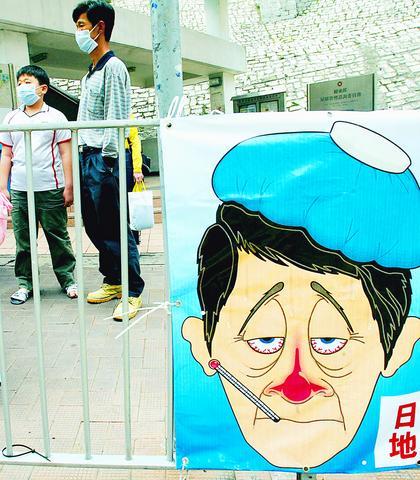The Department of Health (DOH) said yesterday that the nation could expect to be removed from the World Health Organization's (WHO) list of acute respiratory syndrome (SARS) afflicted areas in 15 days.
DOH Deputy Director-General Lee Lung-teng (

PHOTO: REUTERS
"According to the WHO, if no probable cases have been reported in an area for more than 20 days, the area will no longer be listed as an affected area," Lee said.
By that standard, Taiwan will no longer be a SARS-affected area if no probable cases are reported by April 30.
Although Taiwan, the US and the UK are on the WHO's list of affected areas, the world health body distinguishes them from other affected areas because local transmission in them is limited.
According to the WHO, no evidence of international spread of the disease to these three places has been reported since March 15. No transmission other than close person-to-person contact has been reported in these areas either.
Lee said laboratory test results due soon might help determine whether the strength of the causative virus has been declining here, but he said the nation's SARS crisis could expect to be relieved in early June.
"It should be safe for foreigners to do business or travel in Taiwan now," he said, noting that the government has imposed strict measures to combat the spread of the disease.
"For example, anyone entering or leaving the country now is required to fill out SARS survey forms. We have also established standard procedures for international airlines on how to disinfect their planes," Lee said.
He called for the public not to discriminate against visitors from SARS-affected areas.
"The health of all travelers has been strictly screened before they are allowed to enter the country. There should be no concern about their health," he said.
Meanwhile, the Center for Disease Control said that as of yesterday afternoon 156 possible SARS cases have been reported, of which 23 are probable cases and 41 are suspect cases.
The center said 79 cases have been ruled out as being SARS and tests are still being conducted on 13 cases.
Eight of the 23 people diagnosed as probable cases have been discharged from hospitals, while 74 of the 156 reported cases have also been discharged.
CDC Director-General Chen Tzay-jinn (
Chen said there is still a risk of more probable SARS cases nationwide because China-based busi-nesspeople from Taiwan are permitted to travel freely between the two sides of the Taiwan Strait.
Chen said the government would have to wait until all the probable cases have recovered before writing to the WHO to ask it to remove the nation from its list of SARS-affected areas

The US government has signed defense cooperation agreements with Japan and the Philippines to boost the deterrence capabilities of countries in the first island chain, a report by the National Security Bureau (NSB) showed. The main countries on the first island chain include the two nations and Taiwan. The bureau is to present the report at a meeting of the legislature’s Foreign Affairs and National Defense Committee tomorrow. The US military has deployed Typhon missile systems to Japan’s Yamaguchi Prefecture and Zambales province in the Philippines during their joint military exercises. It has also installed NMESIS anti-ship systems in Japan’s Okinawa

‘WIN-WIN’: The Philippines, and central and eastern European countries are important potential drone cooperation partners, Minister of Foreign Affairs Lin Chia-lung said Minister of Foreign Affairs Lin Chia-lung (林佳龍) in an interview published yesterday confirmed that there are joint ventures between Taiwan and Poland in the drone industry. Lin made the remark in an exclusive interview with the Chinese-language Liberty Times (the Taipei Times’ sister paper). The government-backed Taiwan Excellence Drone International Business Opportunities Alliance and the Polish Chamber of Unmanned Systems on Wednesday last week signed a memorandum of understanding in Poland to develop a “non-China” supply chain for drones and work together on key technologies. Asked if Taiwan prioritized Poland among central and eastern European countries in drone collaboration, Lin

Renewed border fighting between Thailand and Cambodia showed no signs of abating yesterday, leaving hundreds of thousands of displaced people in both countries living in strained conditions as more flooded into temporary shelters. Reporters on the Thai side of the border heard sounds of outgoing, indirect fire yesterday. About 400,000 people have been evacuated from affected areas in Thailand and about 700 schools closed while fighting was ongoing in four border provinces, said Thai Rear Admiral Surasant Kongsiri, a spokesman for the military. Cambodia evacuated more than 127,000 villagers and closed hundreds of schools, the Thai Ministry of Defense said. Thailand’s military announced that

NO CONFIDENCE MOTION? The premier said that being toppled by the legislature for defending the Constitution would be a democratic badge of honor for him Premier Cho Jung-tai (卓榮泰) yesterday announced that the Cabinet would not countersign the amendments to the local revenue-sharing law passed by the Legislative Yuan last month. Cho said the decision not to countersign the amendments to the Act Governing the Allocation of Government Revenues and Expenditures (財政收支劃分法) was made in accordance with the Constitution. “The decision aims to safeguard our Constitution,” he said. The Constitution stipulates the president shall, in accordance with law, promulgate laws and issue mandates with the countersignature of the head of the Executive Yuan, or with the countersignatures of both the head of the Executive Yuan and ministers or